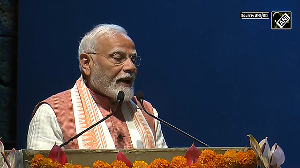India's much-awaited Olympic clash with Australia ended on a sorry note for the country despite a spirited performance by our players.
The Indians conceded a soft goal due to poor stopping and allowed the Aussies to score the winning fourth goal in the dying seconds, thereby making India's chances of qualifying for the semi-finals from Pool 'B' doubtful.
The main problem was our upfront, which did not stretch the Aussie defenders. Most importantly, I think the Indian coach, Gerhard Rach, concentrated more on attacks from the right flank, which predictably resulted in more passes to Gagan Ajit, but he invariably could not trap the ball.
![]()
Also Read
![]()
![]()
![]()
![]()
Indians choked at the crunch![]()
Images from Thursday's matches![]()
![]()
![]()
Had India attacked from the left flank, perhaps more openings could have been created and the Aussie defenders would have been put under pressure.
In this context, it was seen that often Deepak Thakur and Prabhjot Singh did not have any job to do in the forward line as the strategy of the team was to attack only from the right flank.
But despite the loopholes, one would have to say that for the first time in this tournament, India played well in the Australian 25 yard and deservingly took the lead through Deepak Thakur's excellent deflection from a free-hit of Harpal Singh.
The lead put the Australians under great pressure and their midfield struggled for most part of the first half.
But Australia regrouped commendably with their frontline constantly threatening from the edge of the Indian circle. One such good move allowed Australian forward Jamie Dwyer to take a shot at the goal. Adrian D'Souza came up with a smart save but defender William Xalco failed to clear the rebound quickly and the Australians equalised to make it 1-1.
As the match progressed, the two teams started playing cautiously.
Soon after the breather, the Aussie forwards attacked from the left and poor tackling by Harpal Singh helped Dwyer slam the ball in like a bullet. This lead raised the confidence of India's opponents and they soon increased the lead to 3-1.
But the Indians came back into the game strongly and within four minutes turned the match into a lively contest.
Off a long hit from Harpal, Gagan Ajit Singh reduced the margin to 2-3.
The equaliser thereafter was a beauty. A good pass between Deepak Thakur, Ignace Tirkey and Vikram Pillay led to Arjun Hallappa scoring the third goal for India.
Keeper Adrian D'Souza, Dilip Tirkey, William Xalco, Viren Rasquinha and Vikram Pillay were outstanding in their approach throughout the game but the same cannot be said about the other players.
On the contrary, the Aussie attack had variation, operating as they were from both the right and left flanks. It was evident that the four goals that Australia scored were due to the timely transfer of the ball from right to left flank.
These quick transfers tested the Indian defence which committed soft errors, with at least three goals being conceded from the left angle.
It is not that Indian players are not capable of attacking from the left flank but it is the strategy and game plan that went wrong.
One also fails to understand why our players did not play with utmost caution when they were reduced to 10 players by the untimely yellow card to Dhanraj Pillay.
The players should have regrouped in this situation and played out the last six minutes of the game to salvage a draw and keep their chances of qualifying for the semis right on track.
I remember in Sydney Games, where I was the coach, in India's last league match against Poland, Mukesh Kumar was shown a yellow card and we were reduced to 10 players. Then also the team conceded a last minute goal that helped Poland equalize and India failed to qualify for the semis.
It has happened so many times with India and I fail to understand why the players do not realise the importance of points. I think it is the fault of the players and not the coach.







 © 2025
© 2025